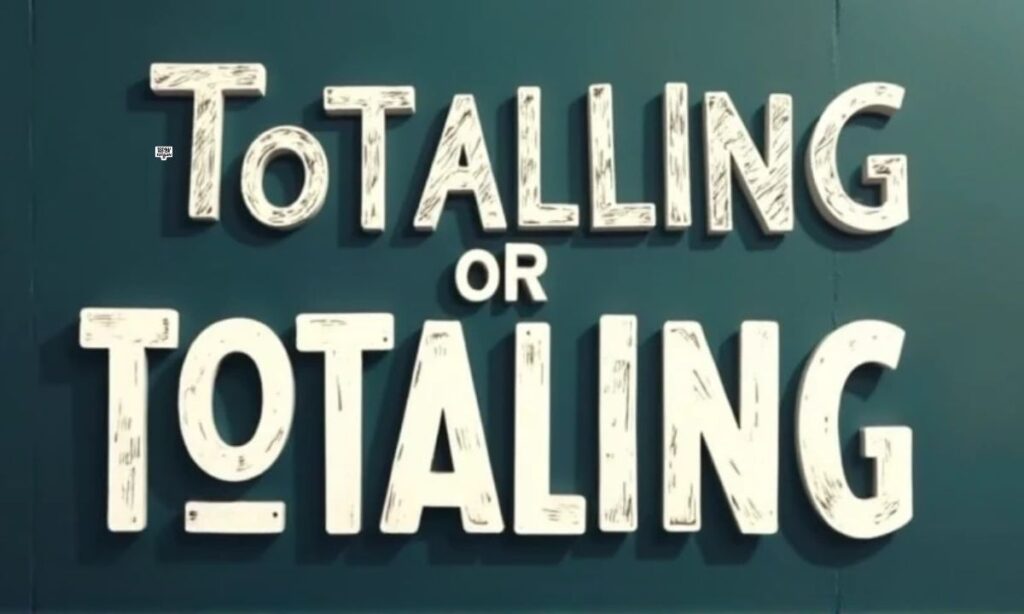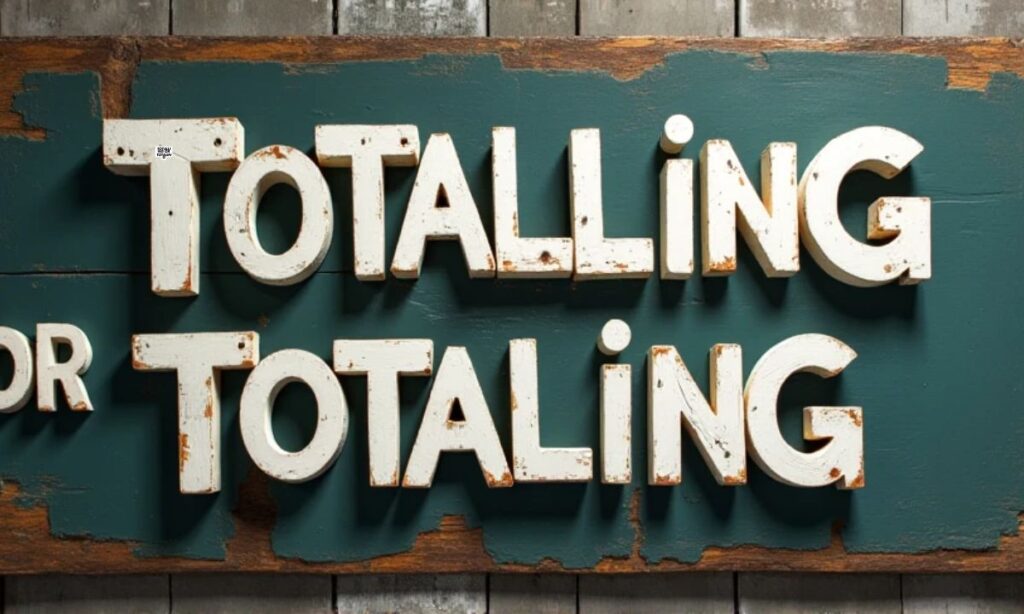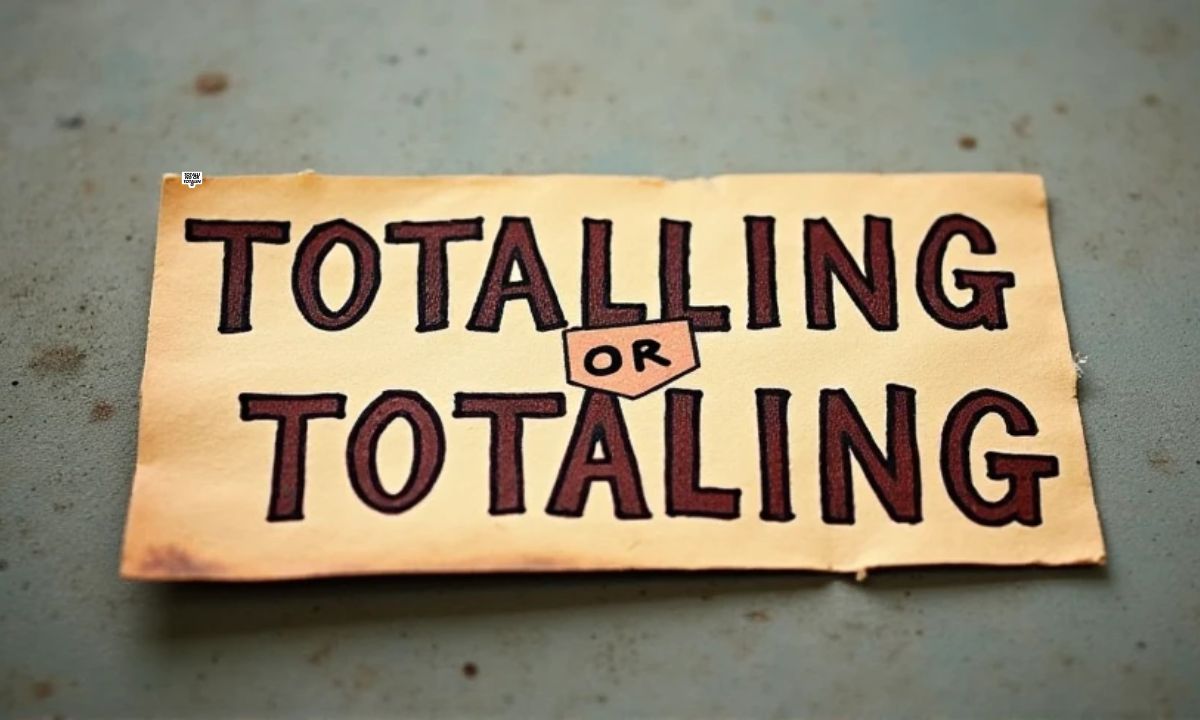Ever found yourself hesitating over whether to write “totalling” or “totaling” in a professional email? You’re not alone. This comprehensive guide breaks down the spelling variations between British and American English, helping you make the right choice every time.
Totalling vs Totaling: The Key Difference
The distinction between “totalling” and “totaling” perfectly illustrates the fascinating divide between British and American English spelling conventions. The British prefer doubling the ‘l’ (totalling), while Americans keep it simple with a single ‘l’ (totaling).
Key Facts About This Spelling Variation:
- British English doubles the final consonant when adding -ing
- American English maintains a single ‘l’ in most cases
- Both spellings are correct in their respective regions
- Usage affects professional credibility in formal writing
The Correct Spelling of Totalling or Totaling
The “correct” spelling depends entirely on your audience and location. In professional writing, matching your spelling to your audience’s expectations can make a significant difference in how your message is received.
| Region | Correct Spelling | Common Usage |
| UK, Australia, Canada | Totalling | Formal business writing, academic papers |
| USA | Totaling | Business communications, everyday writing |
Example Scenario: Email to a British Client
Here’s a practical example of proper usage in UK business context:
Dear Mr. Thompson,
I’m writing regarding the quarterly report, totalling all expenses from January through March. The spreadsheet attached shows our progress in totalling the departmental budgets.
Best regards,
Sarah
Example Scenario: Email to an American Client
And here’s the same message adapted for US audiences:
Dear Mr. Thompson,
I’m writing regarding the quarterly report, totaling all expenses from January through March. The spreadsheet attached shows our progress in totaling the departmental budgets.
Best regards,
Sarah
Regional English Differences: British vs American English

The totalling/totaling distinction represents just one example of systematic differences between British and American English spelling conventions. These variations emerged through historical developments and deliberate reforms.
The Influence of Noah Webster
Noah Webster, the American lexicographer, deliberately simplified many British spellings in his 1828 dictionary. His changes included:
- Removing double consonants
- Dropping the ‘u’ from words like colour/color
- Simplifying -re endings to -er (centre/center)
“The reform of our orthography… is among the first wants of our country.” – Noah Webster
Synonyms of Totalling and Totaling
When seeking alternatives, consider these professional substitutions:
- Calculating the sum
- Computing the aggregate
- Summing up
- Determining the final figure
- Tallying the results
Example Scenario: Accounting Report
Professional accountants often use specific terminology depending on their location:
British Usage:
The year-end figures, totalling £2.3M, reflect strong growth…
American Usage:
The year-end figures, totaling $2.3M, reflect strong growth…
Usage in British vs American English
The divide between British and American spelling conventions runs deeper than just personal preference. These differences reflect centuries of linguistic evolution and deliberate language reforms. In business communications, understanding these nuances can significantly impact your professional image.
British Usage: Totalling in Accounting and Finance
In British financial sectors, “totalling” appears consistently across:
- Annual reports
- Financial statements
- Banking documents
- Tax declarations
- Government publications
Case Study: London Stock Exchange Reports
Financial Report Extract:
“The combined revenue streams, totalling £4.2 billion, demonstrate robust market performance across all sectors…”
American Usage: Totaling in Everyday Speech

American English tends toward simplified spelling patterns, reflecting a practical approach to language. The single ‘l’ in “totaling” aligns with other American spelling simplifications:
| British Spelling | American Spelling |
| travelling | traveling |
| labelling | labeling |
| totalling | totaling |
| signalling | signaling |
| fuelling | fueling |
Accounting and Calculating Totals
Professional writing conventions in accounting deserve special attention. Whether you’re preparing financial statements or business reports, consistency is crucial.
Example Scenario: Accountant’s Report
Consider this professional example:
FINANCIAL SUMMARY
Q4 2024 Revenue Breakdown:
– Direct Sales: $2.3M
– Online Revenue: $1.7M
– Service Contracts: $0.9M
Total Revenue (totaling/totalling*): $4.9M
*Usage depends on region
Spelling Conventions in English
Modern English spelling conventions follow distinct patterns based on word stress and etymology. Here’s what influences consonant doubling:
- Word Stress
- Stressed final syllables typically double
- Unstressed endings often maintain single consonants
- Word Length
- Shorter words tend toward doubling
- Longer words often resist doubling
- Regional Standards
- British English favors more conservative spelling
- American English embraces simplification
British vs American Spelling Differences

The totalling/totaling distinction exemplifies broader patterns in English spelling variations:
| Word Type | British English | American English |
| -our words | colour, favour | color, favor |
| -re words | centre, theatre | center, theater |
| -ll words | totalling, travelled | totaling, traveled |
| -ise/-ize | organise, realise | organize, realize |
Expert Tip: Major style guides like Chicago Manual of Style (US) and Oxford Style Guide (UK) provide comprehensive guidance on regional preferences.
Conclusion: Totalling or Totaling?
The choice between “totalling” and “totaling” ultimately depends on your audience and context. Here’s a quick decision guide:
✓ Use “totalling” when:
- Writing for British, Australian, or Canadian audiences
- Following UK-based style guides
- Working with British financial institutions
✓ Use “totaling” when:
- Writing for American audiences
- Following US style guides
- Creating content for US-based organizations
Remember: Consistency within a document matters more than absolute rules. Choose one spelling and stick with it throughout your writing.
Pro Tip: When writing for a global audience, consider:
- Your primary readership
- Your organization’s style guide
- The formal requirements of your document type
“In matters of commerce, the fault of the Dutch is offering too little and asking too much. The fault of the Jews is in offering too much and asking too little. And the fault of the Yankees is in asking and offering too much.” – George Santayana
This quotation reminds us that regional differences extend beyond spelling into business culture itself – all the more reason to be mindful of your audience when choosing between “totalling” and “totaling.”

